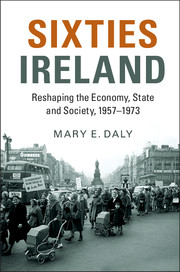Book contents
- Frontmatter
- Dedication
- Contents
- Acknowledgements
- List of abbreviations
- Introduction
- Part I The economy
- Part II Society
- 6 The optimism of a rising tide
- 7 Farewell to ‘the vanishing Irish’
- 8 Women, children and families
- 9 Second-wave feminism and the Irish family
- 10 The churches
- 11 Education, health and welfare
- Part III Politics and international relations
- Conclusion: abandoning the past?
- Bibliography
- Index
11 - Education, health and welfare
from Part II - Society
Published online by Cambridge University Press: 05 March 2016
- Frontmatter
- Dedication
- Contents
- Acknowledgements
- List of abbreviations
- Introduction
- Part I The economy
- Part II Society
- 6 The optimism of a rising tide
- 7 Farewell to ‘the vanishing Irish’
- 8 Women, children and families
- 9 Second-wave feminism and the Irish family
- 10 The churches
- 11 Education, health and welfare
- Part III Politics and international relations
- Conclusion: abandoning the past?
- Bibliography
- Index
Summary
Ask older people about the major changes in the 1960s and they will probably mention the introduction of free secondary schooling by Minister for Education Donogh O'Malley; free travel for old age pensioners; and perhaps the introduction of a choice of doctor for those who were entitled to medical cards. One feature common to all these initiatives is that they happened towards the end of that decade; indeed, the choice of doctor scheme was not introduced until 1972. In the late 1950s and early 1960s, advances in social provision were not on the agenda; the priority was economic growth. One of the dominant principles behind the 1958 economic programme was to concentrate public capital spending on ‘productive’ investment; social spending and social objectives would have to wait. The decade after the Second World War brought a significant expansion in social insurance and publicly funded access to healthcare, plus major investment in hospitals, including sanitoria for the treatment of tuberculosis. Although this fell far short of the British National Health Service and Beveridge-style welfare state, it constituted the largest single extension of health and welfare services since the foundation of the state. By contrast, the last major expansion in government support for education came in the 1931 Vocational Education Act. In the late 1930s, the share of government spending devoted to education in Ireland was among the highest in Europe, but Ireland was one of the few countries where this failed to rise in the 1950s, and in the early 1960s there was no expectation that this would change. In 1961, the government informed the OECD that they expected spending on education to increase by 28 per cent between 1958 and 1970 – one of the lowest projected increases among member countries – and significantly lower than the hoped-for rise in GNP. On these projections, Ireland would be spending half the OECD average educating five- to fourteen-year-olds in 1970, and one-third of the OECD average educating fifteen- to nineteen-year-olds. Ireland was one of only three countries not anticipating a significant increase in enrolment in higher education over the decade. Yet by 1970, all children were entitled to free second-level schooling, and free transport was provided for those living some distance from schools.
- Type
- Chapter
- Information
- Sixties IrelandReshaping the Economy, State and Society, 1957–1973, pp. 214 - 252Publisher: Cambridge University PressPrint publication year: 2016



